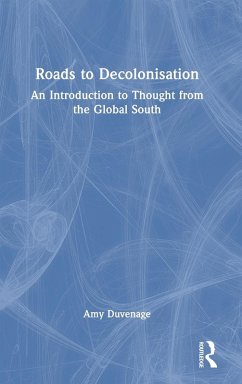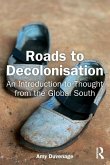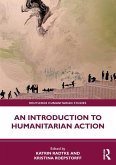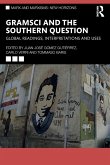- Gebundenes Buch
- Merkliste
- Auf die Merkliste
- Bewerten Bewerten
- Teilen
- Produkt teilen
- Produkterinnerung
- Produkterinnerung
Roads to Decolonisation: An Introduction to Thought from the Global South is an accessible textbook that provides undergraduate students with a vital introduction to theory from the Global South and key issues of social justice.
Andere Kunden interessierten sich auch für
![Roads to Decolonisation Roads to Decolonisation]() Amy DuvenageRoads to Decolonisation40,99 €
Amy DuvenageRoads to Decolonisation40,99 €![An Introduction to Humanitarian Action An Introduction to Humanitarian Action]() An Introduction to Humanitarian Action58,99 €
An Introduction to Humanitarian Action58,99 €![Gramsci and the Southern Question Gramsci and the Southern Question]() Gramsci and the Southern Question58,99 €
Gramsci and the Southern Question58,99 €![Extractivism and Universality Extractivism and Universality]() Japhy Wilson (UK University of Manchester)Extractivism and Universality157,99 €
Japhy Wilson (UK University of Manchester)Extractivism and Universality157,99 €![Roads Not Taken Roads Not Taken]() Michael KimmelRoads Not Taken53,99 €
Michael KimmelRoads Not Taken53,99 €![Decolonising Digital Media and Indigenisation of Participatory Epistemologies Decolonising Digital Media and Indigenisation of Participatory Epistemologies]() Decolonising Digital Media and Indigenisation of Participatory Epistemologies152,99 €
Decolonising Digital Media and Indigenisation of Participatory Epistemologies152,99 €![Extractivism and Universality Extractivism and Universality]() Japhy Wilson (UK University of Manchester)Extractivism and Universality58,99 €
Japhy Wilson (UK University of Manchester)Extractivism and Universality58,99 €-
-
-
Roads to Decolonisation: An Introduction to Thought from the Global South is an accessible textbook that provides undergraduate students with a vital introduction to theory from the Global South and key issues of social justice.
Hinweis: Dieser Artikel kann nur an eine deutsche Lieferadresse ausgeliefert werden.
Hinweis: Dieser Artikel kann nur an eine deutsche Lieferadresse ausgeliefert werden.
Produktdetails
- Produktdetails
- Verlag: Taylor & Francis Ltd
- Seitenzahl: 314
- Erscheinungstermin: 16. April 2024
- Englisch
- Abmessung: 229mm x 152mm x 19mm
- Gewicht: 572g
- ISBN-13: 9781032742540
- ISBN-10: 1032742542
- Artikelnr.: 70069745
- Herstellerkennzeichnung
- Libri GmbH
- Europaallee 1
- 36244 Bad Hersfeld
- gpsr@libri.de
- Verlag: Taylor & Francis Ltd
- Seitenzahl: 314
- Erscheinungstermin: 16. April 2024
- Englisch
- Abmessung: 229mm x 152mm x 19mm
- Gewicht: 572g
- ISBN-13: 9781032742540
- ISBN-10: 1032742542
- Artikelnr.: 70069745
- Herstellerkennzeichnung
- Libri GmbH
- Europaallee 1
- 36244 Bad Hersfeld
- gpsr@libri.de
Amy Duvenage is a lecturer in criminology at Solent University, Southampton. Her teaching and research is interdisciplinary, intersecting across several disciplines including criminology, gender studies, literature, and sociology. She has a particular interest in gender theory, decoloniality, intersectionality and thought from the Global South.
Introduction Part 1. Race and Racism 1. Imperialism, Colonialism and the Racialised Other: W.E.B du Bois, Aimé Césaire, Frantz Fanon, Edward Said and Ng
g
wa Thiong'o 2. Chapter 2 Race and Racism as Systems of Power: Lewis R. Gordon, Paul Gilroy, Stuart Hall, Henry Louis Gates Jr., Kwame Anthony Appiah and Ambalavaner Sivanandan 3. Black Feminist Thought and Intersectionality: Sojourner Truth, Audre Lorde, Angela Davis, bell hooks, Patricia Hill Collins, Kimberlé Crenshaw Part 2. Gender and Sexuality 4. Imperialism, Colonial Discourse and Women: Anne McClintock, Gayatri Chakravorty Spivak, Chandra Talpade Mohanty, Uma Nayaran and Nira Yuval-Davies 5. The Politicisation and Sexualisation of Black Womanhood: Audre Lorde, Angela Y. Davis, bell hooks and Patricia Hill Collins 6. African Feminist Thought: Ifi Amadiume, Obioma Nnaemeka, Oyèrónk
Oy
wùmí, Nkiru Uwechia Nzegwu and Florence Stratton 7. Queer perspectives: Pumla Dineo Gqola, Marc Epprecht, Kopano Ratele and Sara Ahmed Part 3. Identity and (Un)belonging in a Globalised World 8. (Under)Development, Modernity, and Epistemologies of the South: Walter Rodney, Boaventura de Sousa Santos, Simon Gikandi and Achille Mbembe 9. Identity, Migration, Mobility and Diaspora: Homi Bhabha, Arjun Appadurai, Samir Amin and Avtar Brah 10. Citizenship, Nationalism and Xenophobia: A South African Case Study Part 4. Decolonisation and Education 11. Decolonial Feminisms: Françoise Vergès, Awino Okech, Sara Ahmed, Heidi Safia Mirza, Chandra Talpade Mohanty and Sylvia Tamale 12. Criminological and Social Theory and Methods, Settler Colonialism and the Indigenous Context: Biko Agozino, Linda Tuhiwai Smith, Thalia Anthony and Harry Blagg, Chris Cunneen and Simone Rowe, and Raewyn Connell 13. Pedagogies of the South and Ubuntu as a Feminist Decolonial Pedagogy: Paulo Freire, bell hooks, Boaventura de Sousa Santos, Sylvia Tamale, Leonhard Praeg, Ezra Chitando and Siphokazi Magadla, Sabelo J. Ndlovu-Gatsheni, Nomalungelo I. Ngubane and Manyane Makua
g
wa Thiong'o 2. Chapter 2 Race and Racism as Systems of Power: Lewis R. Gordon, Paul Gilroy, Stuart Hall, Henry Louis Gates Jr., Kwame Anthony Appiah and Ambalavaner Sivanandan 3. Black Feminist Thought and Intersectionality: Sojourner Truth, Audre Lorde, Angela Davis, bell hooks, Patricia Hill Collins, Kimberlé Crenshaw Part 2. Gender and Sexuality 4. Imperialism, Colonial Discourse and Women: Anne McClintock, Gayatri Chakravorty Spivak, Chandra Talpade Mohanty, Uma Nayaran and Nira Yuval-Davies 5. The Politicisation and Sexualisation of Black Womanhood: Audre Lorde, Angela Y. Davis, bell hooks and Patricia Hill Collins 6. African Feminist Thought: Ifi Amadiume, Obioma Nnaemeka, Oyèrónk
Oy
wùmí, Nkiru Uwechia Nzegwu and Florence Stratton 7. Queer perspectives: Pumla Dineo Gqola, Marc Epprecht, Kopano Ratele and Sara Ahmed Part 3. Identity and (Un)belonging in a Globalised World 8. (Under)Development, Modernity, and Epistemologies of the South: Walter Rodney, Boaventura de Sousa Santos, Simon Gikandi and Achille Mbembe 9. Identity, Migration, Mobility and Diaspora: Homi Bhabha, Arjun Appadurai, Samir Amin and Avtar Brah 10. Citizenship, Nationalism and Xenophobia: A South African Case Study Part 4. Decolonisation and Education 11. Decolonial Feminisms: Françoise Vergès, Awino Okech, Sara Ahmed, Heidi Safia Mirza, Chandra Talpade Mohanty and Sylvia Tamale 12. Criminological and Social Theory and Methods, Settler Colonialism and the Indigenous Context: Biko Agozino, Linda Tuhiwai Smith, Thalia Anthony and Harry Blagg, Chris Cunneen and Simone Rowe, and Raewyn Connell 13. Pedagogies of the South and Ubuntu as a Feminist Decolonial Pedagogy: Paulo Freire, bell hooks, Boaventura de Sousa Santos, Sylvia Tamale, Leonhard Praeg, Ezra Chitando and Siphokazi Magadla, Sabelo J. Ndlovu-Gatsheni, Nomalungelo I. Ngubane and Manyane Makua
Introduction
Part 1. Race and Racism
1. Imperialism, Colonialism and the Racialised Other: W.E.B du Bois, Aimé Césaire, Frantz Fanon, Edward Said and Ng g wa Thiong'o
2. Chapter 2 Race and Racism as Systems of Power: Lewis R. Gordon, Paul Gilroy, Stuart Hall, Henry Louis Gates Jr., Kwame Anthony Appiah and Ambalavaner Sivanandan
3. Black Feminist Thought and Intersectionality: Sojourner Truth, Audre Lorde, Angela Davis, bell hooks, Patricia Hill Collins, Kimberlé Crenshaw
Part 2. Gender and Sexuality
4. Imperialism, Colonial Discourse and Women: Anne McClintock, Gayatri Chakravorty Spivak, Chandra Talpade Mohanty, Uma Nayaran and Nira Yuval-Davies
5. The Politicisation and Sexualisation of Black Womanhood: Audre Lorde, Angela Y. Davis, bell hooks and Patricia Hill Collins
6. African Feminist Thought: Ifi Amadiume, Obioma Nnaemeka, Oyèrónk Oyewùmí, Nkiru Uwechia Nzegwu and Florence Stratton
7. Queer perspectives: Pumla Dineo Gqola, Marc Epprecht, Kopano Ratele and Sara Ahmed
Part 3. Identity and (Un)belonging in a Globalised World
8. (Under)Development, Modernity, and Epistemologies of the South: Walter Rodney, Boaventura de Sousa Santos, Simon Gikandi and Achille Mbembe
9. Identity, Migration, Mobility and Diaspora: Homi Bhabha, Arjun Appadurai, Samir Amin and Avtar Brah
10. Citizenship, Nationalism and Xenophobia: A South African Case Study
Part 4. Decolonisation and Education
11. Decolonial Feminisms: Françoise Vergès, Awino Okech, Sara Ahmed, Heidi Safia Mirza, Chandra Talpade Mohanty and Sylvia Tamale
12. Criminological and Social Theory and Methods, Settler Colonialism and the Indigenous Context: Biko Agozino, Linda Tuhiwai Smith, Thalia Anthony and Harry Blagg, Chris Cunneen and Simone Rowe, and Raewyn Connell
13. Pedagogies of the South and Ubuntu as a Feminist Decolonial Pedagogy: Paulo Freire, bell hooks, Boaventura de Sousa Santos, Sylvia Tamale, Leonhard Praeg, Ezra Chitando and Siphokazi Magadla, Sabelo J. Ndlovu-Gatsheni, Nomalungelo I. Ngubane and Manyane Makua
Part 1. Race and Racism
1. Imperialism, Colonialism and the Racialised Other: W.E.B du Bois, Aimé Césaire, Frantz Fanon, Edward Said and Ng g wa Thiong'o
2. Chapter 2 Race and Racism as Systems of Power: Lewis R. Gordon, Paul Gilroy, Stuart Hall, Henry Louis Gates Jr., Kwame Anthony Appiah and Ambalavaner Sivanandan
3. Black Feminist Thought and Intersectionality: Sojourner Truth, Audre Lorde, Angela Davis, bell hooks, Patricia Hill Collins, Kimberlé Crenshaw
Part 2. Gender and Sexuality
4. Imperialism, Colonial Discourse and Women: Anne McClintock, Gayatri Chakravorty Spivak, Chandra Talpade Mohanty, Uma Nayaran and Nira Yuval-Davies
5. The Politicisation and Sexualisation of Black Womanhood: Audre Lorde, Angela Y. Davis, bell hooks and Patricia Hill Collins
6. African Feminist Thought: Ifi Amadiume, Obioma Nnaemeka, Oyèrónk Oyewùmí, Nkiru Uwechia Nzegwu and Florence Stratton
7. Queer perspectives: Pumla Dineo Gqola, Marc Epprecht, Kopano Ratele and Sara Ahmed
Part 3. Identity and (Un)belonging in a Globalised World
8. (Under)Development, Modernity, and Epistemologies of the South: Walter Rodney, Boaventura de Sousa Santos, Simon Gikandi and Achille Mbembe
9. Identity, Migration, Mobility and Diaspora: Homi Bhabha, Arjun Appadurai, Samir Amin and Avtar Brah
10. Citizenship, Nationalism and Xenophobia: A South African Case Study
Part 4. Decolonisation and Education
11. Decolonial Feminisms: Françoise Vergès, Awino Okech, Sara Ahmed, Heidi Safia Mirza, Chandra Talpade Mohanty and Sylvia Tamale
12. Criminological and Social Theory and Methods, Settler Colonialism and the Indigenous Context: Biko Agozino, Linda Tuhiwai Smith, Thalia Anthony and Harry Blagg, Chris Cunneen and Simone Rowe, and Raewyn Connell
13. Pedagogies of the South and Ubuntu as a Feminist Decolonial Pedagogy: Paulo Freire, bell hooks, Boaventura de Sousa Santos, Sylvia Tamale, Leonhard Praeg, Ezra Chitando and Siphokazi Magadla, Sabelo J. Ndlovu-Gatsheni, Nomalungelo I. Ngubane and Manyane Makua
Introduction Part 1. Race and Racism 1. Imperialism, Colonialism and the Racialised Other: W.E.B du Bois, Aimé Césaire, Frantz Fanon, Edward Said and Ng
g
wa Thiong'o 2. Chapter 2 Race and Racism as Systems of Power: Lewis R. Gordon, Paul Gilroy, Stuart Hall, Henry Louis Gates Jr., Kwame Anthony Appiah and Ambalavaner Sivanandan 3. Black Feminist Thought and Intersectionality: Sojourner Truth, Audre Lorde, Angela Davis, bell hooks, Patricia Hill Collins, Kimberlé Crenshaw Part 2. Gender and Sexuality 4. Imperialism, Colonial Discourse and Women: Anne McClintock, Gayatri Chakravorty Spivak, Chandra Talpade Mohanty, Uma Nayaran and Nira Yuval-Davies 5. The Politicisation and Sexualisation of Black Womanhood: Audre Lorde, Angela Y. Davis, bell hooks and Patricia Hill Collins 6. African Feminist Thought: Ifi Amadiume, Obioma Nnaemeka, Oyèrónk
Oy
wùmí, Nkiru Uwechia Nzegwu and Florence Stratton 7. Queer perspectives: Pumla Dineo Gqola, Marc Epprecht, Kopano Ratele and Sara Ahmed Part 3. Identity and (Un)belonging in a Globalised World 8. (Under)Development, Modernity, and Epistemologies of the South: Walter Rodney, Boaventura de Sousa Santos, Simon Gikandi and Achille Mbembe 9. Identity, Migration, Mobility and Diaspora: Homi Bhabha, Arjun Appadurai, Samir Amin and Avtar Brah 10. Citizenship, Nationalism and Xenophobia: A South African Case Study Part 4. Decolonisation and Education 11. Decolonial Feminisms: Françoise Vergès, Awino Okech, Sara Ahmed, Heidi Safia Mirza, Chandra Talpade Mohanty and Sylvia Tamale 12. Criminological and Social Theory and Methods, Settler Colonialism and the Indigenous Context: Biko Agozino, Linda Tuhiwai Smith, Thalia Anthony and Harry Blagg, Chris Cunneen and Simone Rowe, and Raewyn Connell 13. Pedagogies of the South and Ubuntu as a Feminist Decolonial Pedagogy: Paulo Freire, bell hooks, Boaventura de Sousa Santos, Sylvia Tamale, Leonhard Praeg, Ezra Chitando and Siphokazi Magadla, Sabelo J. Ndlovu-Gatsheni, Nomalungelo I. Ngubane and Manyane Makua
g
wa Thiong'o 2. Chapter 2 Race and Racism as Systems of Power: Lewis R. Gordon, Paul Gilroy, Stuart Hall, Henry Louis Gates Jr., Kwame Anthony Appiah and Ambalavaner Sivanandan 3. Black Feminist Thought and Intersectionality: Sojourner Truth, Audre Lorde, Angela Davis, bell hooks, Patricia Hill Collins, Kimberlé Crenshaw Part 2. Gender and Sexuality 4. Imperialism, Colonial Discourse and Women: Anne McClintock, Gayatri Chakravorty Spivak, Chandra Talpade Mohanty, Uma Nayaran and Nira Yuval-Davies 5. The Politicisation and Sexualisation of Black Womanhood: Audre Lorde, Angela Y. Davis, bell hooks and Patricia Hill Collins 6. African Feminist Thought: Ifi Amadiume, Obioma Nnaemeka, Oyèrónk
Oy
wùmí, Nkiru Uwechia Nzegwu and Florence Stratton 7. Queer perspectives: Pumla Dineo Gqola, Marc Epprecht, Kopano Ratele and Sara Ahmed Part 3. Identity and (Un)belonging in a Globalised World 8. (Under)Development, Modernity, and Epistemologies of the South: Walter Rodney, Boaventura de Sousa Santos, Simon Gikandi and Achille Mbembe 9. Identity, Migration, Mobility and Diaspora: Homi Bhabha, Arjun Appadurai, Samir Amin and Avtar Brah 10. Citizenship, Nationalism and Xenophobia: A South African Case Study Part 4. Decolonisation and Education 11. Decolonial Feminisms: Françoise Vergès, Awino Okech, Sara Ahmed, Heidi Safia Mirza, Chandra Talpade Mohanty and Sylvia Tamale 12. Criminological and Social Theory and Methods, Settler Colonialism and the Indigenous Context: Biko Agozino, Linda Tuhiwai Smith, Thalia Anthony and Harry Blagg, Chris Cunneen and Simone Rowe, and Raewyn Connell 13. Pedagogies of the South and Ubuntu as a Feminist Decolonial Pedagogy: Paulo Freire, bell hooks, Boaventura de Sousa Santos, Sylvia Tamale, Leonhard Praeg, Ezra Chitando and Siphokazi Magadla, Sabelo J. Ndlovu-Gatsheni, Nomalungelo I. Ngubane and Manyane Makua
Introduction
Part 1. Race and Racism
1. Imperialism, Colonialism and the Racialised Other: W.E.B du Bois, Aimé Césaire, Frantz Fanon, Edward Said and Ng g wa Thiong'o
2. Chapter 2 Race and Racism as Systems of Power: Lewis R. Gordon, Paul Gilroy, Stuart Hall, Henry Louis Gates Jr., Kwame Anthony Appiah and Ambalavaner Sivanandan
3. Black Feminist Thought and Intersectionality: Sojourner Truth, Audre Lorde, Angela Davis, bell hooks, Patricia Hill Collins, Kimberlé Crenshaw
Part 2. Gender and Sexuality
4. Imperialism, Colonial Discourse and Women: Anne McClintock, Gayatri Chakravorty Spivak, Chandra Talpade Mohanty, Uma Nayaran and Nira Yuval-Davies
5. The Politicisation and Sexualisation of Black Womanhood: Audre Lorde, Angela Y. Davis, bell hooks and Patricia Hill Collins
6. African Feminist Thought: Ifi Amadiume, Obioma Nnaemeka, Oyèrónk Oyewùmí, Nkiru Uwechia Nzegwu and Florence Stratton
7. Queer perspectives: Pumla Dineo Gqola, Marc Epprecht, Kopano Ratele and Sara Ahmed
Part 3. Identity and (Un)belonging in a Globalised World
8. (Under)Development, Modernity, and Epistemologies of the South: Walter Rodney, Boaventura de Sousa Santos, Simon Gikandi and Achille Mbembe
9. Identity, Migration, Mobility and Diaspora: Homi Bhabha, Arjun Appadurai, Samir Amin and Avtar Brah
10. Citizenship, Nationalism and Xenophobia: A South African Case Study
Part 4. Decolonisation and Education
11. Decolonial Feminisms: Françoise Vergès, Awino Okech, Sara Ahmed, Heidi Safia Mirza, Chandra Talpade Mohanty and Sylvia Tamale
12. Criminological and Social Theory and Methods, Settler Colonialism and the Indigenous Context: Biko Agozino, Linda Tuhiwai Smith, Thalia Anthony and Harry Blagg, Chris Cunneen and Simone Rowe, and Raewyn Connell
13. Pedagogies of the South and Ubuntu as a Feminist Decolonial Pedagogy: Paulo Freire, bell hooks, Boaventura de Sousa Santos, Sylvia Tamale, Leonhard Praeg, Ezra Chitando and Siphokazi Magadla, Sabelo J. Ndlovu-Gatsheni, Nomalungelo I. Ngubane and Manyane Makua
Part 1. Race and Racism
1. Imperialism, Colonialism and the Racialised Other: W.E.B du Bois, Aimé Césaire, Frantz Fanon, Edward Said and Ng g wa Thiong'o
2. Chapter 2 Race and Racism as Systems of Power: Lewis R. Gordon, Paul Gilroy, Stuart Hall, Henry Louis Gates Jr., Kwame Anthony Appiah and Ambalavaner Sivanandan
3. Black Feminist Thought and Intersectionality: Sojourner Truth, Audre Lorde, Angela Davis, bell hooks, Patricia Hill Collins, Kimberlé Crenshaw
Part 2. Gender and Sexuality
4. Imperialism, Colonial Discourse and Women: Anne McClintock, Gayatri Chakravorty Spivak, Chandra Talpade Mohanty, Uma Nayaran and Nira Yuval-Davies
5. The Politicisation and Sexualisation of Black Womanhood: Audre Lorde, Angela Y. Davis, bell hooks and Patricia Hill Collins
6. African Feminist Thought: Ifi Amadiume, Obioma Nnaemeka, Oyèrónk Oyewùmí, Nkiru Uwechia Nzegwu and Florence Stratton
7. Queer perspectives: Pumla Dineo Gqola, Marc Epprecht, Kopano Ratele and Sara Ahmed
Part 3. Identity and (Un)belonging in a Globalised World
8. (Under)Development, Modernity, and Epistemologies of the South: Walter Rodney, Boaventura de Sousa Santos, Simon Gikandi and Achille Mbembe
9. Identity, Migration, Mobility and Diaspora: Homi Bhabha, Arjun Appadurai, Samir Amin and Avtar Brah
10. Citizenship, Nationalism and Xenophobia: A South African Case Study
Part 4. Decolonisation and Education
11. Decolonial Feminisms: Françoise Vergès, Awino Okech, Sara Ahmed, Heidi Safia Mirza, Chandra Talpade Mohanty and Sylvia Tamale
12. Criminological and Social Theory and Methods, Settler Colonialism and the Indigenous Context: Biko Agozino, Linda Tuhiwai Smith, Thalia Anthony and Harry Blagg, Chris Cunneen and Simone Rowe, and Raewyn Connell
13. Pedagogies of the South and Ubuntu as a Feminist Decolonial Pedagogy: Paulo Freire, bell hooks, Boaventura de Sousa Santos, Sylvia Tamale, Leonhard Praeg, Ezra Chitando and Siphokazi Magadla, Sabelo J. Ndlovu-Gatsheni, Nomalungelo I. Ngubane and Manyane Makua









